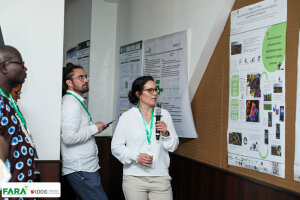
From 2 to 6 June 2025, a status seminar was held in Accra (Ghana) for the research initiative Sustainable Land Management in Sub-Saharan Africa, which is funded by the Federal Ministry of Research, Technology and Space (BMFTR). Around 110 participants from science, politics and practice came together to discuss solutions for the sustainable use of agricultural land in times of climate change and resource scarcity.
One of the initiative's five projects is COINS – Co-developing Innovations for Sustainable Land Management in West African Smallholder Farming Systems – which is being implemented with the participation of the Urban Remote Sensing Working Group of the Geography Department at Ruhr University Bochum.
COINS is working with smallholder farms in Ghana and Senegal to develop practical solutions for sustainable agriculture: new cultivation methods are being tested and evaluated in collaboration with farmers. Field mapping, earth observation and mobile apps help with crop planning and resource conservation. COINS also develops advisory concepts and reviews financing models that promote sustainable management. The findings are incorporated into training courses, regional policy recommendations and international committees. The GI contributes in particular to the development of geodata-based analysis and consulting tools and supports knowledge transfer through workshops and training courses.
The status seminar promoted exchange between the five projects through interactive sessions on shared experiences and synergies. Discussions on the COINS research region of Northern Ghana, where two other projects are also active, were particularly fruitful. Topics such as transdisciplinarity, the use of information and communication technology (ICT) in sustainable agriculture and the utilisation of project results were the focus of attention. A highlight was the ceremonial launch of the jointly developed e-certificate – online learning materials that are now anchored in the curriculum of the University of Environment and Sustainable Development in Ghana. The RUB team contributed learning units on field data collection with low-cost sensor technology and geo-apps, as well as on vegetation description via remote sensing, together with the German Aerospace Centre (DLR).
The results of COINS are being incorporated into international processes – including the SDGs, the Intergovernmental Panel on Climate Change (IPCC) and the UN Convention to Combat Desertification. COINS shows how digitalisation, local cooperation and research can work together to measurably advance sustainable development.
COINS is funded by the BMBF under the funding code 01LL2204E from 2022-2026: Project page COINS - Digital technologies support the sustainable intensification of farming methods in West Africa.